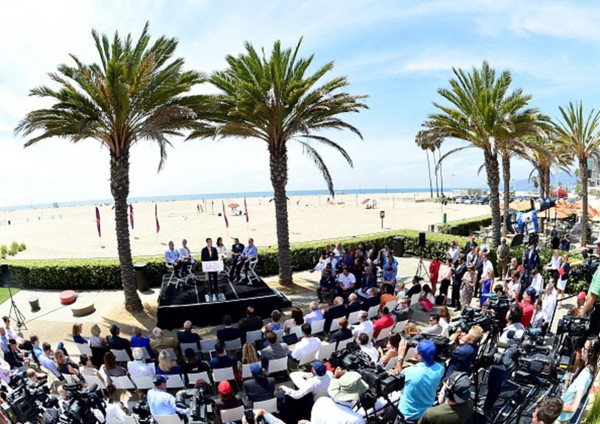Reporting From PyeongChang, South Korea – The “new norm”, a set of cost-cutting measures launched by the International Olympic Committee (IOC) this week that could cut as much as USD $1 billion from the price of the Games, is not enough to lure back cities to bid for the Games IOC President Thomas Bach said Wednesday in PyeongChang.

“This ‘new norm,’ I think, can offer excellent arguments, but others will come into play,” Bach said at a press conference Wednesday at the close of the PyeongChang IOC Session ahead of the Winter Games opening here Friday.
The 117-point reform package has become the IOC’s plan to control the organizational costs of the Games that have been skyrocketing over recent years. Last year the IOC announced new measures to control Games infrastructure costs by loosening requirements and allowing cities to propose existing venues that may not be as close to the host city.
Since Beijing was said to have spent $40 billion to host the 2008 Games and Sochi over $50 billion for the 2014 Winter edition, less cities have come forth to bid for future Games, and others have been defeated in public referendums where there was no appetite for high costs, risks and overruns.
Six applicants fell to two unlikely candidates to host the 2022 Games leaving snowless Beijing to defeat obscure Almaty for the hosting prize. Only Paris and Los Angeles remained of five starters in the 2024 race, and both were awarded consecutive Games.
That’s a significant reduction from last decade when cities lined up, many eventually cut from a short list, to pursue their Olympic dreams.

Four cities are officially taking a hard look at bidding for the 2026 Games, but only one so far, Sion in Switzerland, has confirmed it will apply ahead of the March 31 IOC deadline. The others – Calgary, Stockholm and Sapporo – are working to convince skeptical governments and the public that it is wise to move forward.
Even Sion is not guaranteed, the Swiss city will face a perilous referendum this summer. Many bid cities in Europe have risen, then fallen to pubic voting in recent years. Innsbruck’s 2026 bid in Austria was most recently quashed when taxpayers said ‘no.’
At the end of a lengthy press conference, weary Bach responded to a question about how the “new norm'” might impact the upcoming Sion 2026 referendum.
“This is very difficult to tell. It’s a potential, and there the candidature of Sion already has taken many options… so they already benefit greatly from these reforms,” he said.
“But, you know, these referendums, in a number of Western countries, they are not only decided on the numbers.
“What you can see in a number of Western countries is that big projects which are orientated to the future have difficulties in winning referendums. This is — be it a new airport, be it a new motorway, in my country even be it a new train station and many others, you see a certain tendency that the people expect a return on investment tomorrow, and not necessarily then in seven years or 10 years,” the German added.
“They take all this into consideration. Then – ‘it may be a little bit noisy. Will it work? Will it become more expensive than planned? Do we really need it?’ There are many arguments and in particular to the Winter Games, on the occasion of such a candidature, climate change is being discussed.
“It will be up to the Swiss people, and the people of Valais to decide,” he said.
But it will be up to the IOC to deliver the “new norm” message to the Swiss constituents in the home of the Olympic Movement,
Meanwhile a new survey released by the Salt Lake Tribune Wednesday revealed 83 per cent across Utah are behind hosting another Olympic Winter Games in their state.
The IOC will elect the 2026 host city in September 2019.
GamesBids.com is reporting from PyeongChang this week. Follow us @gamesbids on Twitter or on Facebook for updates.


